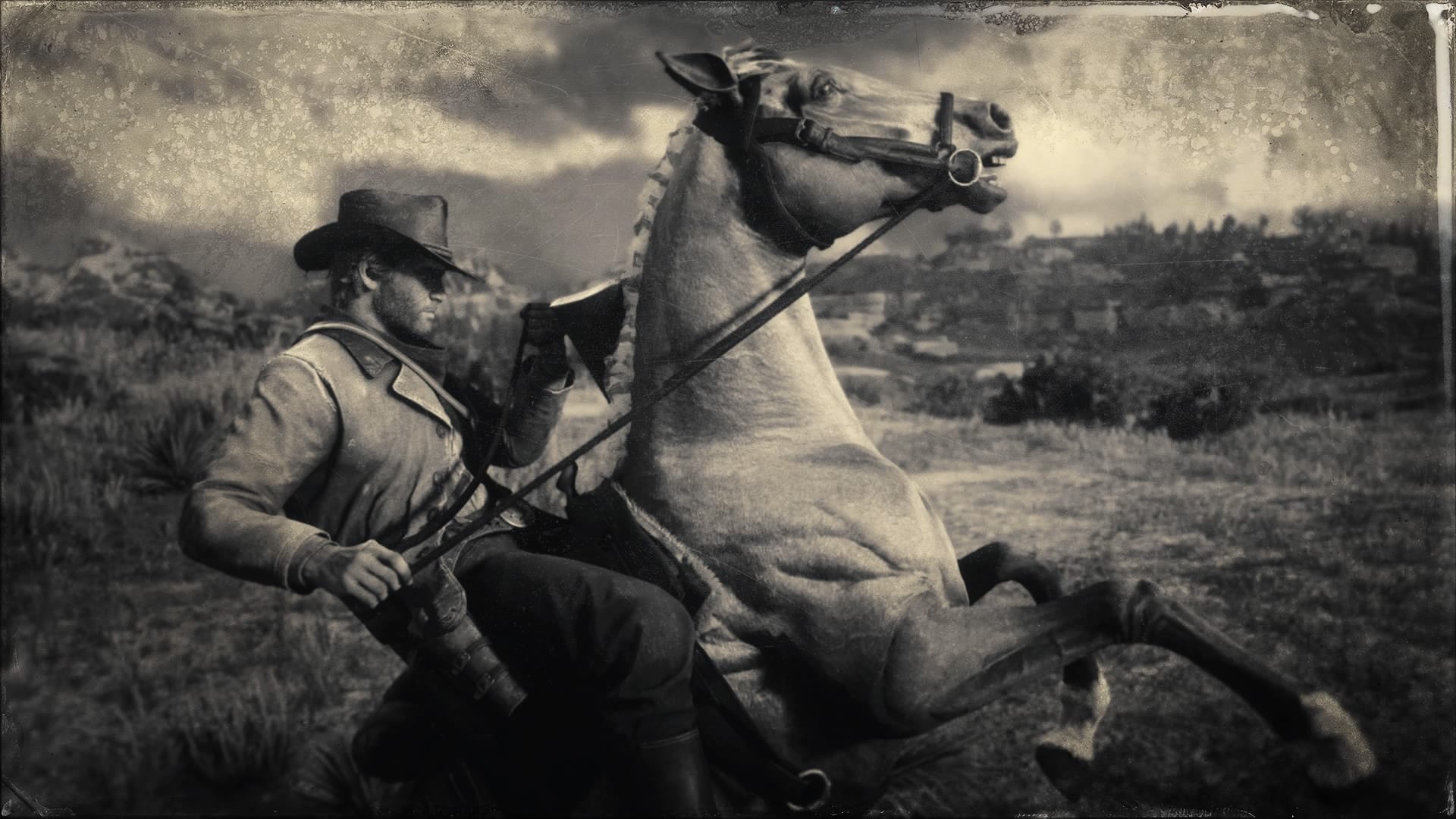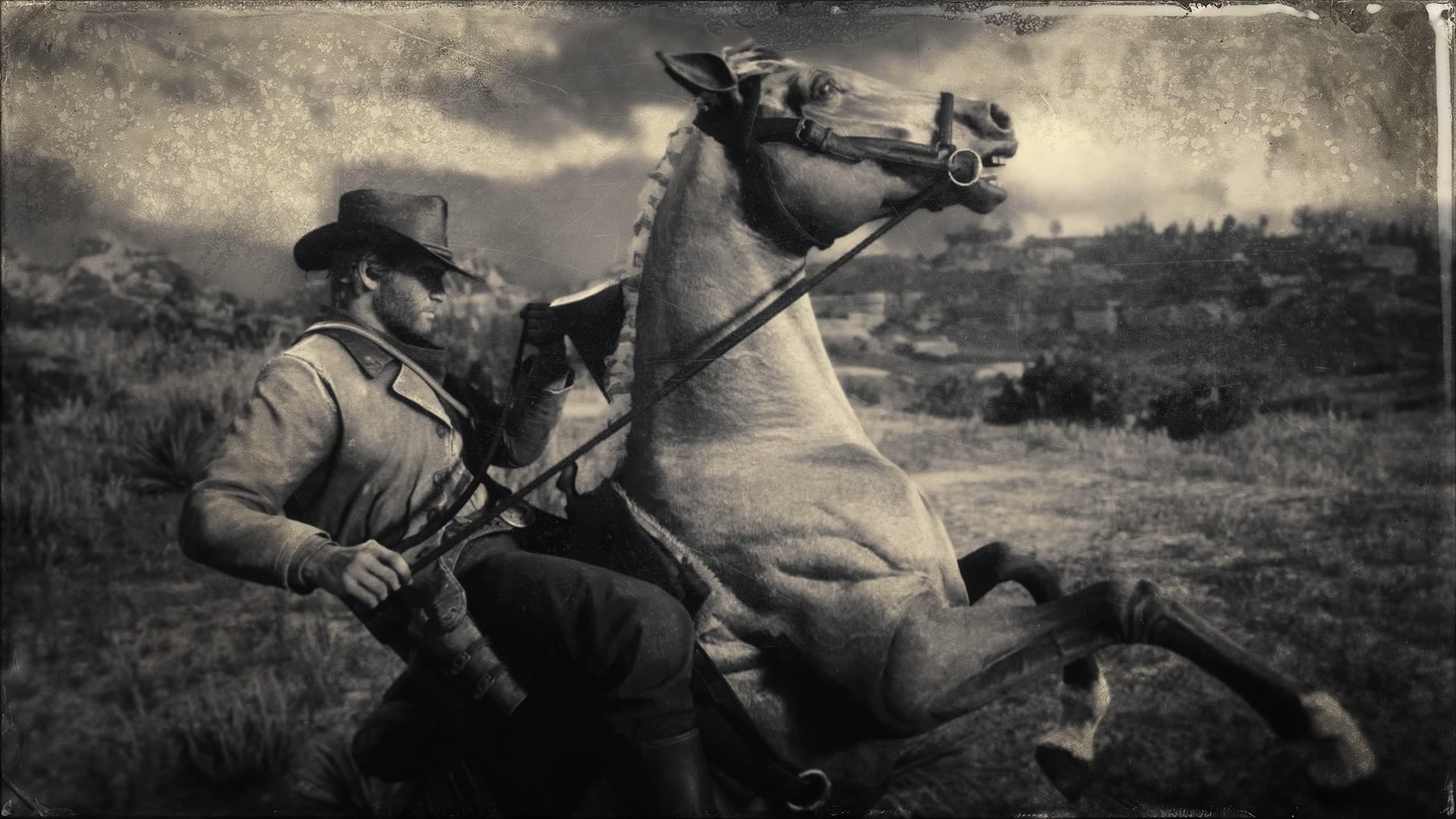RD2: "Who The Hell Is Leviticus Cornwall?"


This article will look closely at the RD2 mission "Who The Hell Is Leviticus Cornwall?" as one (is not THE) most important segement of Chapter 1: Colter.
This mission is a perfect demonstration of the storytelling expertise invested in RD2 and the rich variety of narrative tools used in telling the epic western produced by Rockstar Games.
Spoiler Disclaimer: While I am trying not to give away too many surprises, this article is likely to include a few spoilers - so, if you have not played RD2 yet, please do and experience this amazing title for yourself first (it's worth all the hours, sweat and tears you will invest into it).

The Mission
Narrative Devices and Storytelling Tools
During this mission, a variety of each having a specific effect on the narrative of the game ang player experience altogether. Each of these tools are described in the following section of the article.
- Title Mission
- Genre Trope (The Train Robbery)
- Travel Exposition
- Biome Transition and Pathetic Fallacy
- Reframing
- Revealing Omission
- Deductive Assumptions
- Epistolary Elements
- Character Framing
- Completing The Mission

1 - Title Mission
Mission Titles in RD2 are largely retorical, satirical or humouristic clued commentaries (or statement) about the mission itself. They tend to echo the voice and witt of Arthur as if was refering to these events as part of his journaling process, or, maybe, the voice of an external narrator looking at the overall narrative for the distance of history (same author as the opening title card and chapter editor of the game). These titles are non descriptive for most part, but set as a (sometimes elusive) clued commentaries - 'Who The Hell Is Leviticus Cornwall?' is no exeption to this approach.
Cutting the O'Discroll gang to the chase and implementing their plans to rob Cornwall's train, Dutch and the gang is stealling from a man they know very little about. This wild and impulsive bet for quick bank (trains are easier to rob than to open safes after all), will trigger an unexpected chain of events for the rest of the game. Ultimately, 'Who The Hell Is Leviticus Cornwall?' is the very question Arthur and the player will ask themself at the closing of this mission having scratched the surface of a man with great power and influence accross the coutry.

2- Genre trope (The Train Robbery)
This particular mission is highlighting one of the most iconic element of the western genre - a train robbery going wrong!
Steam trains and railway hold a very important place in the classic western tapistery. It's a symbol of opportunity, change, progress, the development of industry, and the creation of new cities in remote locales of the country (as recently seen in Power Of The Dog, 2021, by Jane Campion). It's the taming of the wild country by the progress of civilisation.
Train robberies stories can be seen from the very first westen film every produced in 1903, Jessie James (1939), High Noon (1952), Once Upon A Time in the West (1968), Butch Cassidy and the Sundance Kid (1969), and about 100 other films western produced ever since (see currated list of titles on IMDb: https://www.imdb.com/list/ls069248895/)
It's without surprise RD2 is using this context in one of the early mission of the game, honnoring one of the train robbery trope and the western genre altogether with this high octane mission.
Dutch is now gathering his key compadres, ready to travel accross the map, and steal the goods of a certain Leviticus Cornwall - a man of wealth and notable importance, who appears not to need what the freight is transporting, at least that's what Dutch is thinking...

3 - Travel Exposition
As the gang ride towards a distant locale of the map, we are exposed to series of important information. As mentioned in the first chapter, this narrative device is called 'Travel Exposition' - it's a tool used to make the best of spacial transition to infuse background information and anticipatory elements for what is yet to come.
This technique is generally used in Open World RPG video games and TTRPG sessions - for the latest, it allows players to roleplay their characters and to create bounds during low-intensity campaign segments.

4 - Biome Transition and Pathetic Fallacy
A cut-scene montage shows the gang riding accorss a white landscape. The color palette of these successive shots implies a long ride, maybe a day or two, transiting from early / mid-day / evening lights.
As the dialogue resume, the biome changes as the gang rides downhill, revealing first sighting of ground mud and long grass pearcing through a thining coat of snow. The clouds open (2:35) to reveal a warm 'spring-like' light and the first dash of green leaves appear on screen.
Arthur: Out of the snow, finally.
There is something warm and hopefull about this sight, as it was time for the gang's fortune to be renewed - as if fast and despair will soon be replaced by prosperity. This could stand as another Pathetic Fallacy. This assumption is also supported by Dutch change of tone, now sounding more hopeful and anthousiastic.

5 - Reframing
Dutch sounds more positive as the sun shines over the gang, and he re-esatblsihes the name of the gang members riding with him as a legendary prelude of their soon-to-be success. There is something very Arthurian about this scene (in the most medieval way), as if the player was a told the introduction of a crusade or tale of chivalery.
This is enphasis marks the begining of the mission yet to come, and anchors the key characters involved in gameplay at this particular point in time - it calls for the attention of the player and brings a particular focus on the importance of the mission ahead.
Javier: You sure you're ready for this, kid?
Lenny: 'Course I'm ready.
Dutch: Just stay calm, keep your eye sharp. That goes for all of you. No mistakes, not again.
In this piece of dialogue, Lenny is established as the youngest member of the crew, and one very eager to please. Dutch is expressing some positive re-enforcement in a parental fashion. Whilst Javier sounds more doubtful about Lenny's readyness, Dutch gives Lenny an advice - an advice all could benefit from.
There is something rather empathic about Dutch in this moment - it feels he is teaching Lenny 'a thing or two' just like he did with Arthur and John many years before. It's also important to underline Dutch has no child of his own and this is the closest he could be from being a father figure.
The 'no mistakes, not again' is a clear reference of previous roberry of the sorts - assumably Blackwater (the big omission of the game this far).

6 - Revealing The Omission
As the story progresses in chapter 2, we get to know a little more about what happened in Blackwater. This slow reveal will be operating in the background during most of the game - teasing the player about this mysterious event...
It's a very effecient way to use a backstory, here shared in small increments rather than in flashback or a one piece recounting. It's keeps our interest and curiosity alive, while allowing opportunities for surprises, nuanced perspectives, and the involvement of unreliable narrators to contribute to our understanding of the failed heist - all having a piece of the puzzle to share in their own time. It adds an extra layer to background narrative, higlighting the conflicts and tensions amongs gangmembers, and the instability of the group as a whole.
Arthur: How many times are you going to ask the same question, Micah?
Micah: That's a lot of damn money to leave sitting for too long.
Charles: It would be crazy to go back there now. The place will be swarming with Pinkertons.
Dutch: We go back when I say we go back, and that's the end of it. The money's safe, you'll just have to trust me. And if the O'Driscolls are right, there'll be a stack of railroad bonds on this train, good money, once we work out how to cash them. Now everyone shut up and get your mind on the job at hand. Come on.
The gang arrives at their destination, a lookout point over the railroad.
Dutch is ascerting dominance as a leader with directive verbal authority, as well as placing a request for trust reenforcement. His attitude is somewhat creating distance betwee the gang and the loot of Blackwater. It's would be fair to assume the poor living condition of the gang could be improved should Dutch agreed on returning to Blackwater. There is something 'off' and supicious about his connection with the loot...
Eventually, the train arrives and, well, the explosive in place doesn't blow out.
Diffusing Dutch critisism, Arthur jumps on the roof of the train in motion in desperate attempt to regain control of the situation. Expectadly, Lenny is in danger and is saved by Arthur (you have the choice to help or not - your decision will affect Lenny's branched dialogue back in the camp).
Now you have to fire you way up to the locomotive to take controll of the engine. Follows a big action scene and a lot of shooting (not much to share on a narrative perspective - all is very self-explanatory. Bang! Bang! Bang!).

7 -Deductive Assumptions
The gang eventually gets the upper hand, and Arthur is left with the exploration of an opulent rear car.
The visual of the car and the nobility of the decor indicates Cornwall seems to be educated (lots of books), in his late 60's to earl 70's (portrait on the wall), and appears to be a sophisticated member of high-society.
As the crew is looting the safe, dialogue comments on the finding invoices and other evidence of sugar commerce in the West Indies, as well as the order of a new european boat. Cornwall clearly appears as a rich entrepreneur with leverage, means, and influence.
As such, nothing in this scene establishes a objective truth about Cornwall (non-present in the scene), but this tapestry of details is brushing the edges of who he might well be - one element at a time - leaving us with a speculative appreciation of his status, personality, reputation, and power. This technique is used extensively in detective stories to bredcrum character descrption and the build-up of greater anticipation.

8 - Epistolary Elements
In complement of these findings and observations, Arthur comes accros a letter and telegram providing more context about a recent trading aggreements involving Cornwall - it seams Cornwall is funding an operation to locate petrol in the Wapiti Indian Reservations, now waiting for the report of a new exploration. This letter is signed by Leland Oil Development Company.
A telegram is also refering Corwall concerns about the management of a coal mine in Annesburg. The Jameson Mining Company indicates coal and oil are two very different type of businesses, and Jamerson invites him for a visit of the mine in an attempt to diffuse any doubt about his investment.
All these elements are extremely important to build the reputation of Cornwall as rich industrial and enterpreneur, with methods that could be unethical (a man ready to do what it takes to successed). The loyalty of his staff also underline his influence and his ability to pay good money for what he cares about.
We are left with the idea of someone powerful who has reach accross different parts of the country, and even beyond the borders of the USA.
Cornwall appears to me as alternative version Dutch, should he had been part of high society.

9 - Character Framing
This common technique is often used in film, games and litterature to frame the protagonist with characters showing their own alternative paths in life.
These characters often have similar archetype status or actant functions but demonstrate more radical behaviour (good or bad) acting as cautionary tales of who the protagonist could become further down the story (generally at the end of Act 2 - ie. The Leap of Faith).
These alternative archetypes are often in close proximity of the character of interest (such as friends, colleagues, mentors, family members). In the case of Arthur, Micah and Hosea are the extrem opposite of the outlaw archetype depicted in the game. Micah's wrecked impulses (low honnor) and Hosea grounded and subtle view (high honnor) offer Arthur two visions for the man he could become should he takes the left path, or the right one.
For Dutch, Cornwall appears to be an alternative version of who he could have been given birthright in noblety - Duth aspiring to more wealth, respect and status in society; in this situation it's easy to anticipate the creation of an nemysis fed by misplaced ego, envy and destructive narcisim.

10 - Completing The Mission + End of Chapter 1
Eventually, Arthur is left with the possiblity to kill or let the staff go (your honor level will be impacted accordingly). Arthur will start the locomotive and let the train gains motion on the tracks. He will jump out and return to camp.
Once back, Hosea will invite Dutch to lead the gang to Horsehoe Overlook near the catlle town of Valentine. There, they will be able to rest and stay out of trouble - at least for a little while. Dutch will approve and will get the group moving...
The cut-scene shows the gang in exile once again, travelling for days through the a cold and snowing landscape, now following the muddy path of a green montain.
The weather is changing to a more claiment climate, and the instrumental theme song of the game 'See The Fire In Your Eyes' is played softly to accompany the slow pace of the wagoons accross this beautiful natural landscape.
Eventually, Arthur and Hosea will get to the top of a ridge after a heart-to-heart dialogue about the outlaw life. Horsehoe Overlook will be on of the key campsite of the gang for the next chapter of the game.

Conclusion
RDR2 is a narrative masterpiece, borrowing storytelling devices and cultural elements from the entire Western genre - literature, film, music, and more - with both grace and fun. Moreover, it is an aesthetic experience that invites the player to explore the story of a traditional outlaw whose values and morals are questioned within a period of profound cultural transition - where tradition collides with progress, rural way-of-life gives way to the modernity of the 'American Civilisation', and an entire class of white-collar criminals rise to power - making the iconic gunslingers a thing of the past.

ESRB Rating: RD2 is rated M for Mature.
PEGI Rating: This game has received a PEGI 18 rating due to scripted graphic violence and other mature topics within the fictitious context of gameplay. While violent behavior is a component of the game, it is not its sole focus. Themes, topics, character actions, and behaviors should be considered within the fictitious context of the game only. This content is listed as 'not for children' and may be subject to further age restrictions as per YouTube policies and terms of service.
Copyright Disclaimer: Rockstar Games, Inc. ©2005-2019. Rockstar Games, Red Dead Redemption, R*, Redemption, Red Dead, Dead Eye are trademarks/logos/copyrights of Take-Two Interactive. Dolby and the Double-D symbols are trademarks of Dolby Laboratories. The ratings icon is a trademark of the Entertainment Software Association. All other marks and trademarks are properties of their respective owners. Artwork and pictures featured in this article are propreties of Rockstar Games. All rights reserved.
This stream and article is honoring the terms of the Policy on Posting Copyrighted Rockstar Games Material - for any takedown request or complains please contact Matt at contact [at] mattgoesrogue.com
Amazon Affiliate Disclaimer: MattGoesRogue is part of the Amazon Associates Program. As an Amazon Associate I earn from qualifying purchases (read more).

Featured and mentioned in this session: Arthur Morgan, Dutch, Sadie Alder, John, Mihca, Davey Callander, Negan, Blackwater, Grizzly Mountains, Abandoned mining town, Ambarino, Colter (temporary camp), Failed robbery, Gang fleeing from Blackwater, Scouting for food and supplies, Loyalty and support, Power dynamic, Threatening and hostile world, Core game mechanics, Tutorial activities, Character motivations, Dark past, Stranded in a mining village, Blizzard

MattGoesRogue Youtube Channel | Twitter | Instagram


